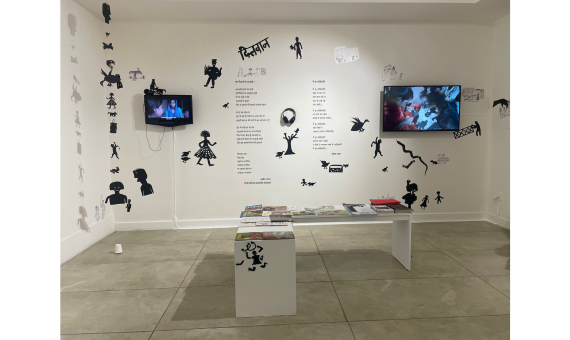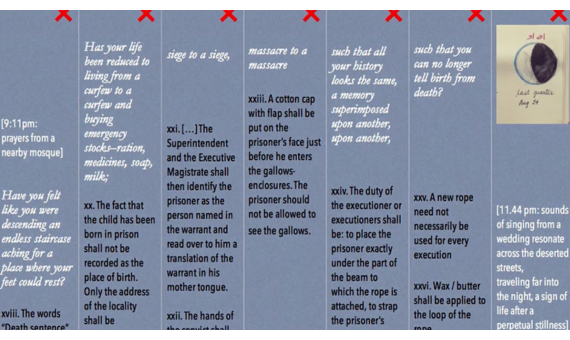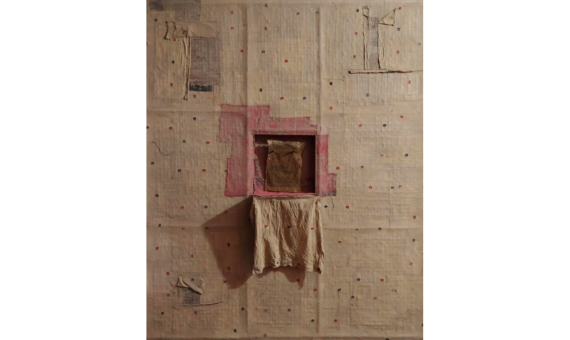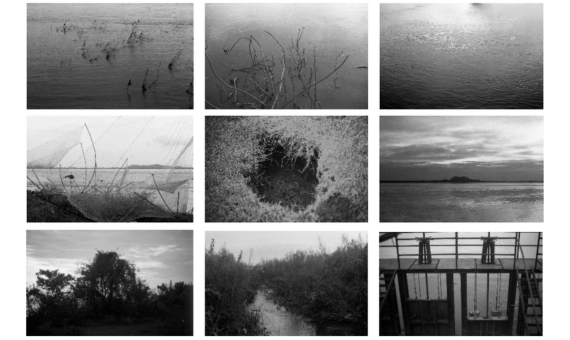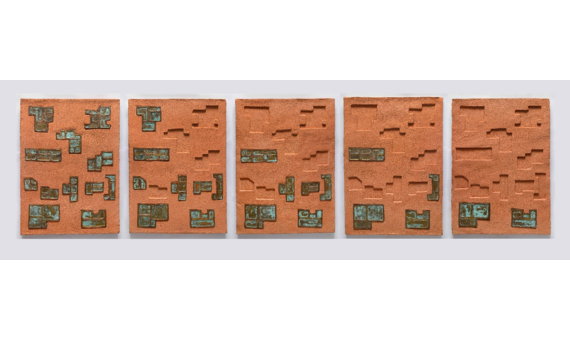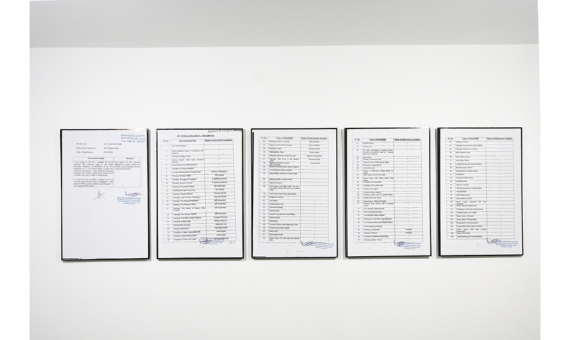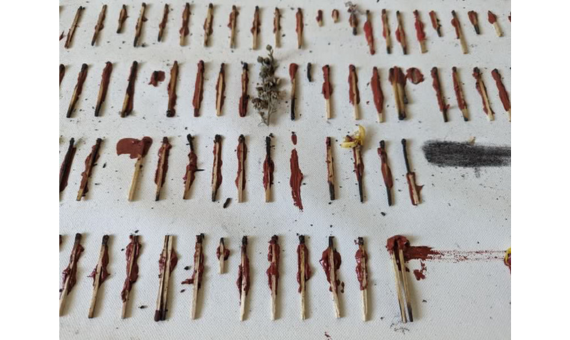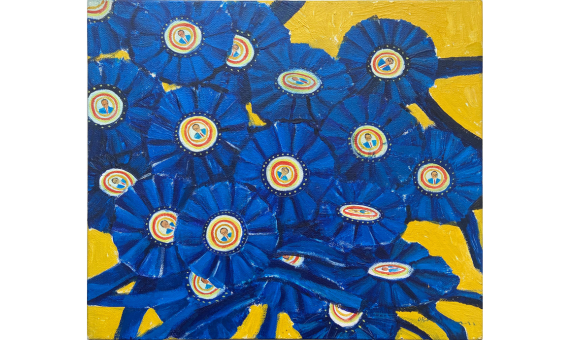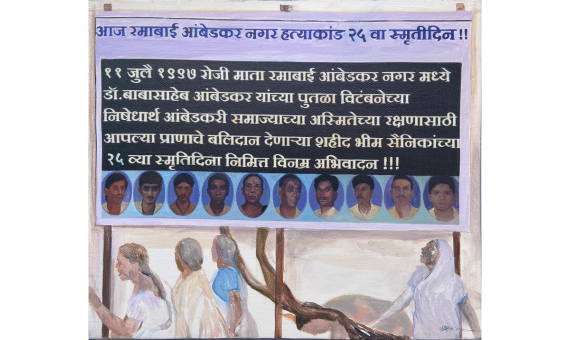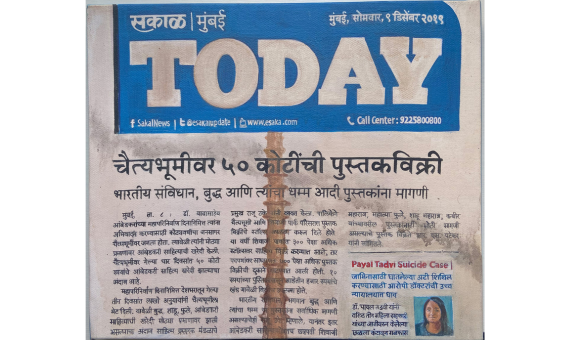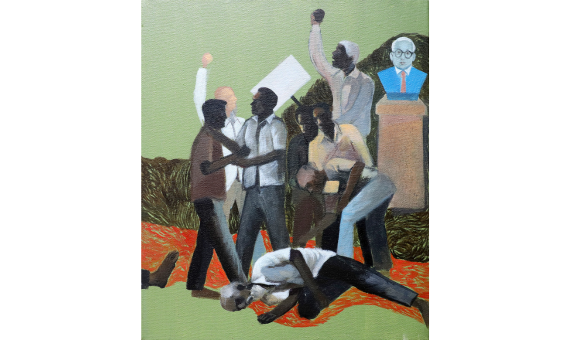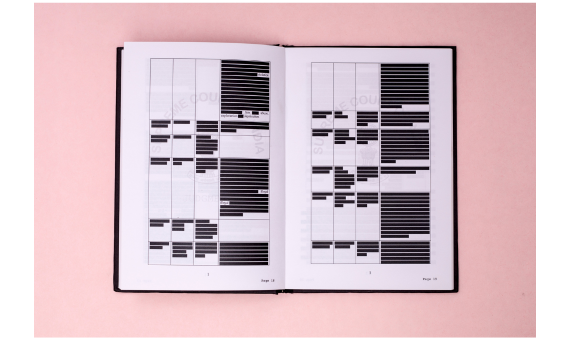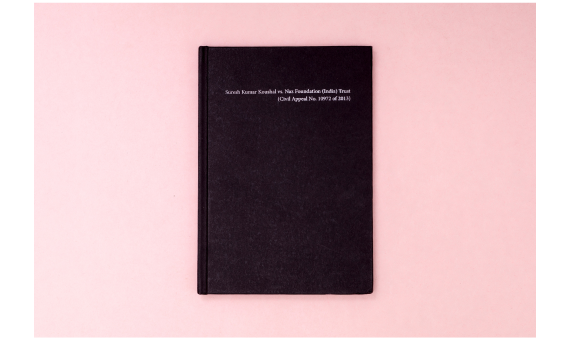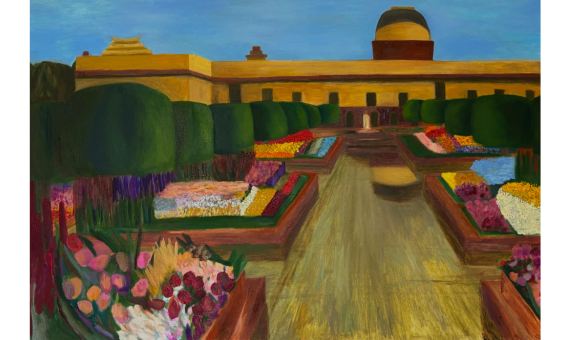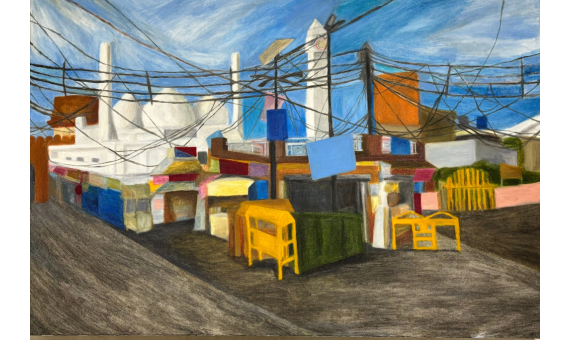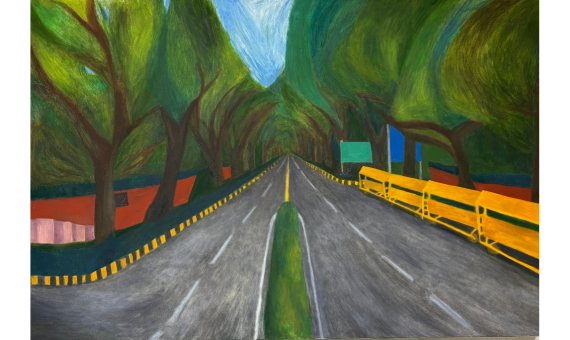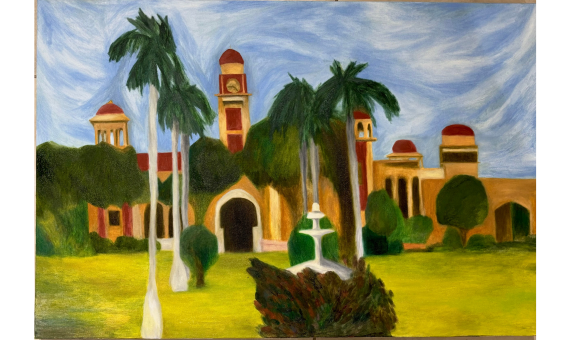About the Artists
Aban Raza
Aban Raza held her first solo exhibition, Luggage, People and a little space, at Galerie Mirchandani + Steinruecke in Bombay, India in 2020. In 2022, she had her second exhibition titled There is something tremendous about the blue sky, which attempted to raise fundamental questions about the life of ‘the large minorities’ and other ‘working majorities’ and the right to protest and exist. Her curatorial work with Sahmat includes: Celebrate. Illuminate. Rejuvenate. Defend the Constitution at 70 (2020), India is not lost (2021) and Hum Sab Sahmat (2022).
She lives and works in Delhi, India.
Biswajit Thakuria
Biswajit Thakuria is a multidisciplinary artist whose practice revolves around social memories and landscape dialogues. He investigates landscapes as intricate, multi- layered phenomena, aiming to revisit significant events from Assam’s past by engaging with archival memories, both public and private. Within his approach, there is a deliberate investigation into the role of power—not only in controlling and erasing these events but also in shaping the representation of landscapes. Biswajit’s practice spans photography, videos, and drawings and he primarily works with organic materials inspired by the process of mask-making in Assam. He did his BFA and MFA from Kala Bhavana, Visva Bharati, Santiniketan. He has participated in the Students Biennale as part of Kochi- Muziris Biennale (2022-23) in Kochi, Immerse Fellowship 2.0 in Mumbai (2023), and Khoj Share in New Delhi (2023), “A Season of Conviviality”; a group exhibition by Kala Bhavana at Lalit Kala Akademi, New Delhi (2022).
He received the Prince Claus Seed Award in 2023.
He works around Guwahati and Santiniketan, India.
Dixita Deka
Dixita Deka is a Postdoctoral Fellow at North Eastern Social Research Centre (NESRC), Guwahati. Currently, she is working on a project on food sovereignty funded by the Swedish Research Council. Co-written with her project team, Seeds and Food Sovereignty: Eastern Himalayan Experiences (2023) is her first book which brings together farmers, researchers, activists, and students in reflecting on the future of seeds and indigenous food in the Eastern Himalayas. In 2021, she received her PhD degree in Social Sciences from the Tata Institute of Social Sciences (TISS), Guwahati Campus, and her thesis focused on the symbiotic relation between power and violence in explaining the politics of memorialising the extra-judicial killings in Assam. Her writings are published in academic journals/press like Asian Ethnicity, Zubaan, Economic & Political Weekly, International Journal for Intersectional Feminist Studies, South Asia@ LSE, Seminar, as well as in print/popular media like The Assam Tribune, The Telegraph, Frontline, The Daily Star, Raiot, The India Forum, amongst others. She has received the Zubaan-Sasakawa Peace Foundation Grant for Young Researchers from Northeast India in 2019, the Annual VMMF-IAWS Young Research Scholar’s Award 2020, and has been a Fellow at the South Asia Speaks literary mentorship program 2022.
Malik Irtiza
Malik Irtiza (Kashmir) is a visual artist whose work traverses across various media such as installation, video, sound, text and sculpture. Situated at the intersection of artistic speculation and historical enquiry, her work seeks to develop possibilities of looking at time and voids to articulate the questions of language, memory, everyday life and history writing in contested territories. The work locates itself in the void(s), disrupted, incoherent, non-sensible, and de- ordered inarticulations. It takes recourse in the folklore, storytelling, myth-making and local histories to open up discussions about fragmented time. its articulations and inarticulations by taking recourse to the incoherent, non-sensible folklore, myth and voids in conflict zones such as Kashmir.
Irtiza has a background in History and Visual Art studies.She has been a part of Khoj Peers Share 2023, recipient of FICA Emerging Artists Award 2022, and the National Award winner of Students' Biennale Awards, Kochi Muziris Biennale 2022-23. She is also the recipient of Inlaks - Unidee Award for International Artists' Residency in Biella, Italy 2023. Irtiza is based in Srinagar, Kashmir.
Nihaal Faizal
Nihaal Faizal’s works respond to the copy, the replica, the remake, the gadget, and the gimmick. He is based in Bangalore, India, where he founded Reliable Copy, a publishing house for works, projects, and writing by artists.
Shefalee Jain
Shefalee Jain is an artist, illustrator and educator based in Delhi, India. She taught Visual Art as Assistant Professor at the School of Culture and Creative Expressions (SCCE), Ambedkar University Delhi (AUD) from 2012-2022. She completed her Practice based PhD in Visual Art from SCCE, AUD in 2021.
Shefalee is the co-founder of BlueJackal, an independently run platform for engaging with, creating and publishing visual narratives. She is also the co-founder and co editor of the zine Drawing Resistance. She has illustrated several children’s books for publishers like Tulika, Eklavya and Muskaan and writes a regular column on art for young readers in Chakamk (a magazine published by Eklavya, Bhopal).
Uzma Falak
Born and raised in Kashmir’s Srinagar, Uzma Falak is pursuing her doctoral studies in anthropology at the University of Heidelberg and she teaches at the University of Tübingen. Her research explores Kashmir women’s soundmaking practices as sites of alternate spatialities, temporalities and modalities. Her poetry, articles, essays, and reportage have appeared in several publications, including English Language Notes, Disclaimer, Economic and Political Weekly, Guernica Magazine, The Baffler, Adi Magazine, Al Jazeera English, Warscapes, The Caravan, The Electronic Intifada, Palestinian Chronicle, Vittles among others. She has contributed to Gossamer: An Anthology of Contemporary World Poetry (Ink Publication, 2015), Of Occupation and Resistance: Writings from Kashmir (Tranquebar Press, 2013), and Can You Hear Kashmiri Women Speak? (Women Unlimited, 2020). In 2017, she won an honorable mention in the Society for Humanistic Anthropology’s Ethnographic Poetry Award. She was also part of the Warwick Tate Exchange, The Production of Truth, Justice and History, held at the Tate Modern, London. Her film, Till Then The Roads Carry Her explores Kashmir women’s lifeworlds and repertories of resistance and has been screened at several venues such as Art Gallery of Guelph (Guelph), Tate Modern (London), Cine Diaspora (New York), University of Copenhagen, University Of Warsaw, School of Art and Aesthetics (Jawaharlal Nehru University, New Delhi), Karlstorkino Cinema (Heidelberg) among others. Between 2021-2022, she has been a part of the Regional Arts Australia’s artist-led online studio program and is currently a part of Capture All: A Sonic Investigation – a collaboration of Australia Council for the Arts, Liquid Architecture, and Sarai, focused on exploring sound/ listening as resources of power, capture, and extraction.
Maheen Mirza
Maheen Mirza is a cinematographer and independent filmmaker whose work has emphasised a collective and localized approach to cinema. Co-founder of Ektara Collective, she actively fosters collaboration among diverse individuals, both trained and untrained, to craft films deeply rooted in shared realities both in aesthetics and theme. Much of her work has located itself with women, children and people who usually hold adivasi, dalit, minority, queer, trans identities. It is the camaraderie which emanates from here that breathes life into her work. She has directed and cinematographed fiction and non fiction features and short films that have been awarded and recognised nationally and internationally. Her latest film Ek Jagah Apni (A Place of Our Own), was showcased as a part of NFDC's Film Bazaar's Goes to Cannes at the Marche du Film (Festival De Cannes) 2022 before premiering at the 35th Tokyo International Film Festival. Some of her other works include Agar Wo Desh Banati (If She Built a Country), Checkmate (Turup), Jaadui Machchi (Fishy Magic). Working closely with Muskaan, an educational organization with a firm belief in transformative storytelling, she has developed oral and written text and visuals that emerge organically from the contexts and life journeys of children from Denotified and Nomadic Tribes into stories that find a tangible existence in print.
Muskaan Foundation
At Muskaan, we have believed in an empowering education journey that is liberating yet grounding, for students from marginalized communities. We also believe that schooling cannot be an isolated input in a vulnerable community when caste apartheid and economic deprivation is a daily experience. To overcome such daily challenges, we promote collective groups and local leadership with different age groups, where each community member is on their personal journey and also drawing strength from a collective pursuit. Thereby, children’s Azad Jugnu Club, adults’ Shahri Mazdur Sangathan and youth-led Majal are determining the course of work in their areas and responding to varied challenges. In this journey, issues of protection as sexual abuse, violence, or access to entitlements, as health or work are areas which have become an integral concern to the organization.
We have been actively working and learning on this journey with members of denotified tribes and the urban poor since 1998. Bringing forward creative expression that reflect experiences, lives and histories of people of these communities as they see them, using contemporary means and technology, in text, video, audio and other forms of documentation, is our way of bringing their voices and our learnings into the larger world.
Sandip Kuriakose
Sandip Kuriakose graduated with an MVA (Painting) from MS University, Baroda (2014) and a BFA (Painting) from the College of Art, New Delhi. The primary focus of his work has been an examination of power structures that is based in the ethnographic, archival and biographical. His primary materials are photography, text and publications. Shows include i.e., The Fulcrum, Los Angeles; In Our Veins Flow Ink and Fire, Kochi-Muziris Biennale Fifth Edition, Kochi; Let no one mistake us for the fruit of Violence, Goethe-Institut / Max Mueller Bhavan, Chennai; Tender Data, Mumbai Art Room, Mumbai; Listening as Practice, Gallery MMB Goethe-Institut / Max Mueller Bhavan, Mumbai; In Search of Baba Singh, UCI, California; Against the Order Of, Clark House Initiative, Mumbai; FotoFest International 2018 Biennial Central Exhibition INDIA- Contemporary Photographic and New Media Art, Houston; Regimes of Truth, Gate Dance Forum, New Delhi; The 6th European Month of Photography, Das Foto Image Factory, Berlin; Art for Young Collectors, Gallerie Mirchandani + Steinruecke, Mumbai; and United Art Fair, New Delhi among others. Residencies include Gasworks London (2022) sponsored by the Charles Wallace, Inlaks Trust, Clark House Initiative (2018), CONA Foundation (2018), TIFA Working Studios (2018) and the Summer Residency Program, School of Visual Arts (2013). He is currently pursuing his MFA (Visual Arts) at the University of California, Riverside. He lives and works in California.
Vikrant Bhise
Vikrant Bhise is a visual artist who lives and works in Mumbai, India. At the forefront of struggle against caste-based domination and its vertiginous implications on land, liberty and labour, Vikrant’s artistic practice iterates his commitment to the revolutionary spirit inherent in the Ambedkarite consciousness.
An alumnus of L.S. Raheja School of Art (Graduate Diploma in Visual Arts, 2010) and J.J. School of Art (D.P.EAD, 2011), Mumbai, Vikrant has exhibited in group and solo projects. His solo exhibition, Human curated by Katharina Domscheit-D'Souza, was on view at Jehangir Art Gallery (2019).
Select group exhibitions include Art Mumbai, Anant Art Gallery (2023); Keep it Real, curated by Srinivas Aditya Mopidevi, Dhi Artspace, Hyderabad (2023); Fault Lines, curated by V Divakar, Conflictorium: Museum of Conflict, Ahmedabad (2023); India Art Fair, Anant Art Gallery, New Delhi (2023); Dismantling the Aesthetics of Inhibition: Representing Difference, curated by Y. S. Alone, Gallery OED, Cochin (2022); Naya Anjor, Anant Art Gallery, New Delhi (2022); Revolution and Counter Revolution for Secular Art Movement, Jehangir Art Gallery, Mumbai (2022); All That is Life at Space 118, Mumbai (2021) among others. He is the recipient of a National Award by Lalit Kala Akademi for the series Impressions, in 2018.

